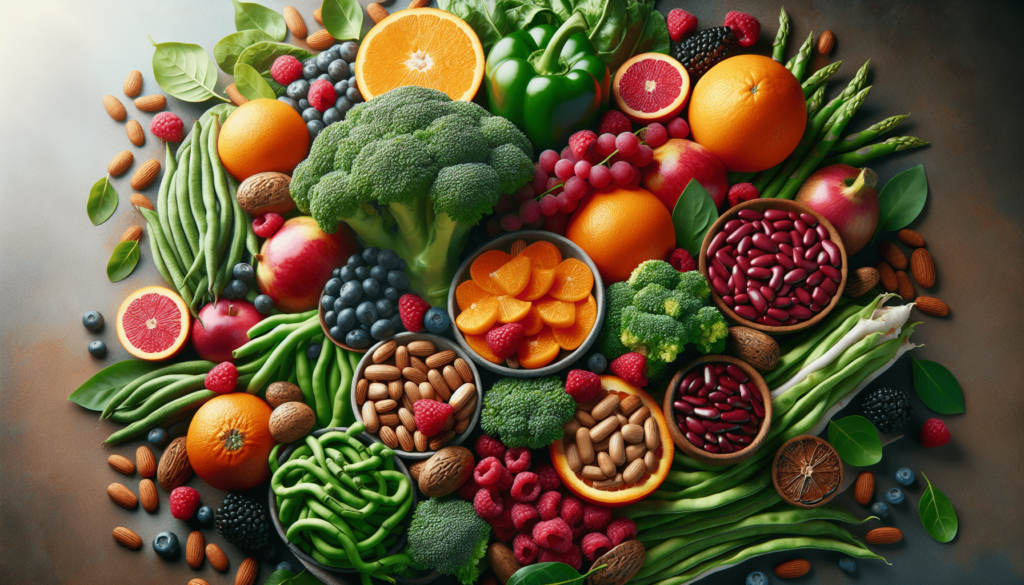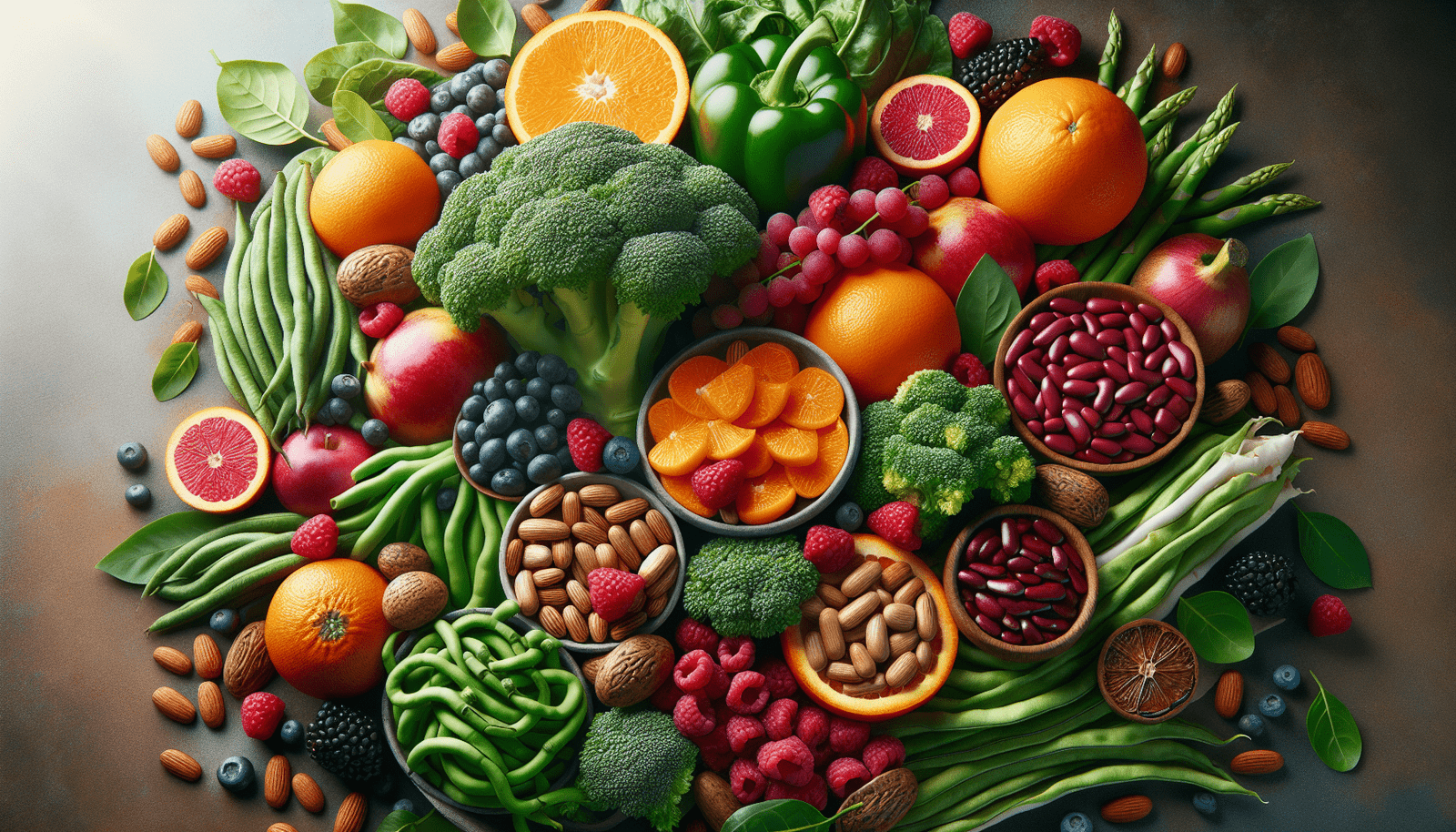Are you looking to improve your overall health and well-being? Have you considered incorporating more fiber into your diet? As a friendly guide, let’s explore the top reasons why you should eat more fiber and the benefits it can bring to your body. Let’s dive in together!
What is Fiber and Why is it Important?
Fiber is a type of carbohydrate that the body cannot digest. It plays a crucial role in maintaining good digestive health by aiding in the smooth movement of food through the digestive system. Fiber can be found in plant-based foods such as fruits, vegetables, legumes, whole grains, and nuts.
Eating enough fiber is essential for your overall health because it can help prevent constipation, reduce your risk of chronic diseases, and promote a healthy gut microbiome. By incorporating more fiber-rich foods into your diet, you can support your digestive system and improve your overall well-being.
Did you know that fiber can help regulate your blood sugar levels and prevent sudden spikes in insulin? This can be particularly beneficial for those with diabetes or insulin resistance.
Digestive Health Benefits of Fiber
One of the primary benefits of eating more fiber is its positive impact on digestive health. Fiber helps to promote regular bowel movements, prevent constipation, and maintain a healthy digestive system. By adding fiber to your diet, you can improve the overall function of your digestive tract.
Fiber acts like a broom in your digestive system, helping to sweep away waste and promote healthy bowel movements. This can prevent constipation and keep your digestive system running smoothly.
In addition to preventing constipation, fiber can also help prevent other digestive issues such as diverticulitis, hemorrhoids, and irritable bowel syndrome (IBS). By keeping your digestive system healthy and functioning properly, you can reduce your risk of developing these uncomfortable conditions.
By adding fiber-rich foods to your diet, you can create a healthy environment in your gut that promotes the growth of beneficial bacteria and supports proper digestion.

Weight Management Benefits of Fiber
Incorporating more fiber into your diet can also be beneficial for weight management. Fiber-rich foods are often lower in calories and can help you feel full and satisfied for longer periods of time. This can lead to reduced calorie intake and support healthy weight loss or maintenance.
High-fiber foods take longer to digest, which can help you feel fuller for longer and prevent overeating. This can be particularly helpful for those looking to manage their weight or make healthier food choices.
Furthermore, fiber can help regulate your blood sugar levels and prevent spikes in insulin, which can be beneficial for those looking to control their appetite and reduce cravings for unhealthy foods. By choosing fiber-rich options, you can support your weight management goals and make healthier choices overall.
Adding more fiber to your diet can help you create a more balanced and nutritious meal plan that supports your weight management efforts and promotes long-term health and well-being.
Heart Health Benefits of Fiber
Another key reason to eat more fiber is the positive impact it can have on heart health. High-fiber diets have been linked to a reduced risk of heart disease, stroke, and high blood pressure. By incorporating more fiber-rich foods into your diet, you can support a healthy heart and lower your risk of cardiovascular issues.
Fiber can help lower cholesterol levels by binding to bile acids in the digestive tract and promoting their elimination from the body. This can help reduce the buildup of cholesterol in the arteries and support heart health.
In addition to lowering cholesterol levels, fiber can also help regulate blood pressure and reduce inflammation in the body, which are both important factors in maintaining a healthy cardiovascular system. By eating more fiber, you can protect your heart and support overall cardiovascular health.
By choosing whole, fiber-rich foods such as oats, beans, and fruits, you can help lower your risk of heart disease and improve your overall cardiovascular health.

Potential Cancer Prevention Benefits of Fiber
Incorporating more fiber into your diet may also help reduce your risk of certain types of cancer, particularly colorectal cancer. High-fiber diets have been linked to a lower risk of developing colorectal cancer, as fiber can help promote healthy digestion and eliminate waste from the body.
Fiber acts as a protective barrier in the digestive tract, helping to prevent harmful substances from coming into contact with the lining of the colon and potentially causing damage that can lead to cancer.
Furthermore, fiber-rich foods contain antioxidants and other beneficial nutrients that can help protect cells from damage and reduce inflammation in the body, which are important factors in cancer prevention. By eating a diet high in fiber, you can support your body’s natural defenses against cancer and promote overall health and well-being.
By making simple changes to your diet, such as adding more fruits, vegetables, and whole grains, you can help reduce your risk of developing colorectal cancer and other types of cancer.
Improving Blood Sugar Control with Fiber
For individuals with diabetes or insulin resistance, eating more fiber can be particularly beneficial in helping to regulate blood sugar levels and prevent sudden spikes in insulin. Fiber-rich foods have a lower glycemic index and can help slow the absorption of sugar into the bloodstream, which can be beneficial for those looking to manage their blood sugar levels.
High-fiber foods can help prevent blood sugar spikes and crashes by slowing down the release of glucose into the bloodstream. This can be especially helpful for individuals with diabetes or insulin resistance.
Additionally, fiber can help improve insulin sensitivity and reduce insulin resistance, which are important factors in maintaining healthy blood sugar levels and preventing complications associated with diabetes. By incorporating more fiber into your diet, you can support your body’s natural ability to regulate blood sugar and promote overall health.
By making small changes to your diet, such as choosing whole, fiber-rich foods over processed options, you can help improve your blood sugar control and reduce your risk of developing diabetes or other complications related to insulin resistance.
How to Incorporate More Fiber Into Your Diet
If you’re looking to eat more fiber and reap the many health benefits it offers, there are several simple ways you can incorporate fiber-rich foods into your diet. By making small changes to your eating habits and meal choices, you can increase your fiber intake and support your overall health and well-being.
Start by adding more fruits and vegetables to your meals, as these foods are naturally high in fiber and can easily be incorporated into a variety of dishes. Try adding a side salad or fruit salad to your meals to boost your fiber intake.
Choose whole grains over refined grains whenever possible, as whole grains contain more fiber and essential nutrients than their refined counterparts. Opt for whole grain bread, pasta, and rice to increase your fiber intake and support healthy digestion.
Snack on nuts, seeds, and legumes throughout the day to add more fiber to your diet and boost your overall nutrient intake. These foods are not only high in fiber but also rich in protein, healthy fats, and other beneficial nutrients.
Incorporate more fiber-rich foods into your cooking and meal preparation by trying new recipes that feature beans, lentils, and whole grains. Experiment with different flavors and textures to find delicious ways to add more fiber to your diet.
Be mindful of your serving sizes and portions when incorporating more fiber-rich foods into your diet, as consuming too much fiber too quickly can cause digestive discomfort. Gradually increase your fiber intake over time to allow your body to adjust and avoid potential side effects.
Stay hydrated throughout the day by drinking plenty of water, as fiber absorbs water in the digestive tract and can help prevent constipation. Aim to drink at least eight glasses of water per day to support healthy digestion and promote regular bowel movements.
Consult with a registered dietitian or healthcare provider if you have any specific dietary concerns or medical conditions that may impact your ability to increase your fiber intake. They can provide personalized recommendations and guidance to help you achieve your health and wellness goals.
By making small, manageable changes to your diet and meal choices, you can easily increase your fiber intake and enjoy the many health benefits that come with eating more fiber. Whether you’re looking to improve your digestive health, manage your weight, support heart health, or prevent chronic diseases, adding more fiber to your diet can be a simple and effective way to enhance your overall well-being.
Conclusion
In conclusion, eating more fiber is a simple and effective way to support your overall health and well-being. By incorporating fiber-rich foods into your diet, you can improve your digestive health, manage your weight, support heart health, prevent cancer, and regulate your blood sugar levels. Whether you’re looking to make small changes to your diet or overhaul your eating habits entirely, adding more fiber to your meals can have a significant impact on your health and wellness.
So why wait? Start including more fiber-rich foods in your daily meals and experience the many benefits that fiber has to offer. Your body will thank you for it, and you’ll be well on your way to a healthier, happier lifestyle. Here’s to your health and well-being!

